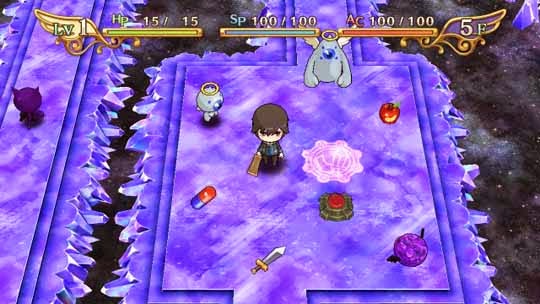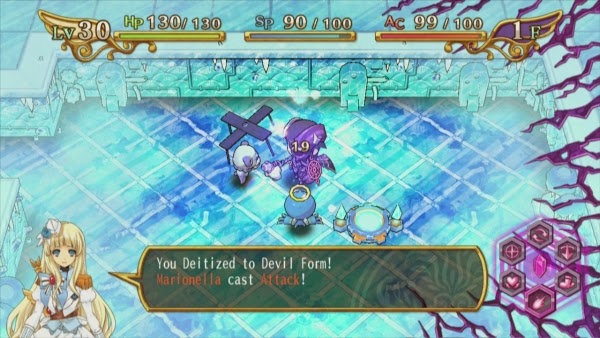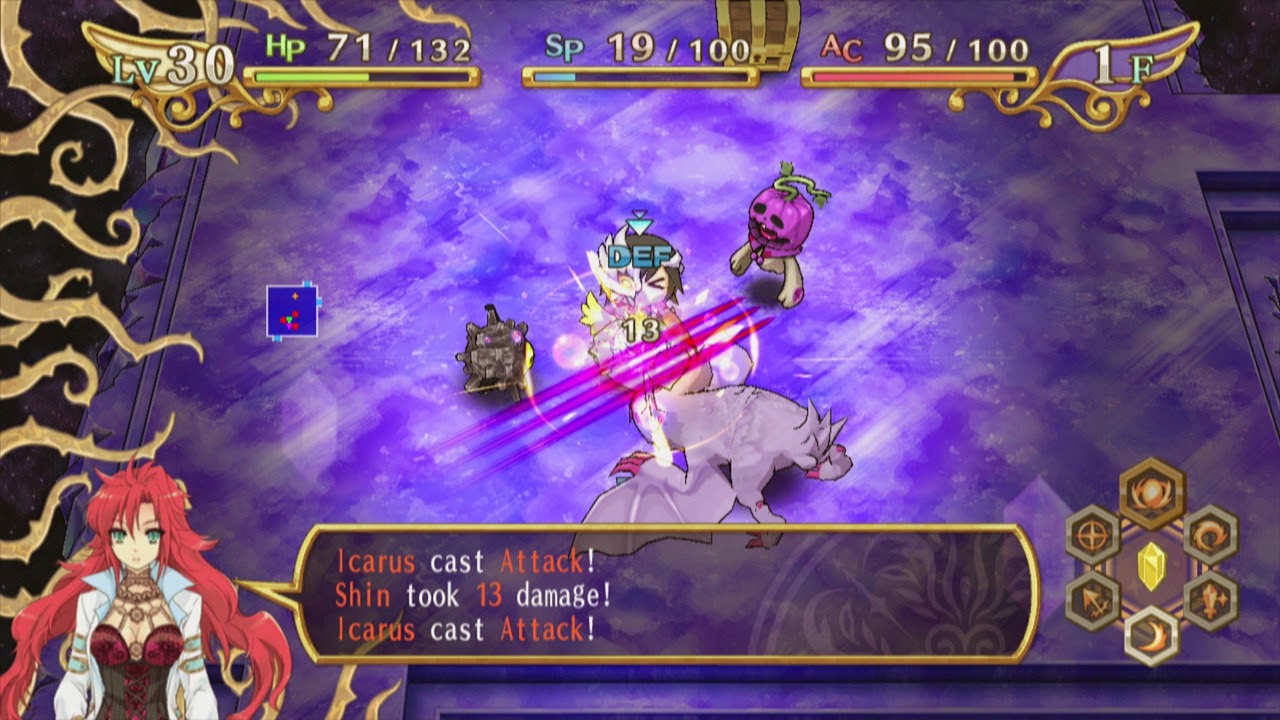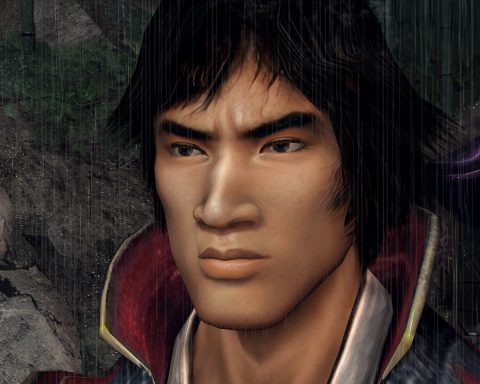Nippon Ichi’s The Guided Fate Paradox was a truly lovely surprise when it launched back in 2013. A new IP for the developer/ publisher, it was a roguelike that managed to do a couple of creative things with its combat system and bring innovation to a genre more traditionally associated with a stubborn adherence to tradition. Further, it was backed by a really interesting narrative that, as the title suggests, was filled with all kinds of mental mind puzzles.
Related reading: For more insight on the roguelike check out our Game Theory piece on the roguelike and absurdism.
The Awakened Fate Ultimatum has a different title, but it is very much the sequel to The Guided Fate Paradox. The same basic premise stands as its predecessor – in a battle between angels (who are often not all that angelic) and demons (who will often not be the pure evil you might expect), a human teenager is called up to take on the role of God. He’s thrust into this role completely unprepared and without actually seeking it out, and this means the opening few chapters involve an endless stream of complaints about his lot in life, but he nonetheless finds himself taking up arms to right a cosmic balance that has fallen significantly in favour of the demons.
However, where The Guided Fate Paradox was happy to lead players through a linear narrative, and then leave it up to them to puzzle through the themes it raised for themselves outside of the gameplay, The Awakened Fate Ultimatum wants to be more directly interactive with the player. An ultimatum is traditionally a demand, whereby one party gives another a certain amount of time to come to a decision about a proposal, with threats being used to encourage the other party to comply. In The Awakened Fate Ultimatum, however, most of the decisions that are put before the player are more of the “sadistic choice” variety of decision making. Much like the original Sam Raimi Spiderman film, where Peter Parker is asked to decide between saving his girlfriend and a carriage full of people, in The Awakened Fate Ultimatum, players are presented with two responses to a particularly difficult choice, with both decisions having some sharp consequences.
These “ultimatums,” are the weakest part of the game. While the potential was there for Nippon Ichi to explore and challenge player morality in a way not dissimilar to how Telltale Games has perfected the art in hitting players with difficult dual choices in its games, in practice your decisions actually have little impact on the flow of the narrative. For example, early on the angels capture a demon, and after an interrogation decided that he needed to be killed. The decision on whether to pull the proverbial trigger, however, was left to me. After loading me up with the realisation that the demon had a wife and family at home and was simply fighting out of a sense of duty, I was asked to make the difficult decision. After putting down the controller and weighing the choices I decided that I would condemn the demon in order to further the angel’s cause. You can imagine my surprise, then, when after making that decision Shin (the protagonist) changed his mind and no, he didn’t really want to kill the demon, so the demon escapes. After that the plot progresses in what I can only assume is the exact same direction that it would have travelled had I chosen the other option.
This kind of false decision making has been a hallmark of the JRPG genre since Final Fantasy existed. It’s a genre that almost universally is more interested in telling a good story than allowing players room on the leash to explore their own ideas, and it’s something I enjoy for the same reason that when I sit down to read a book I’m not necessarily in the mood to re-write it to suit how I would like to see it pan out. I’ve got the likes of Skyrim and Dragon Age to explore consequences in decision making, and JRPGs are there for me to kick back with a beer and enjoy following along. It becomes dangerous, however, when a game promises real consequence to the decisions you make, only to the rip the carpet out from under you with a mighty “gotya! Here’s how the story actually pans out…” afterwards. That veers dangerously close to misleading the player.
Later on there are some decisions that have a lasting impact on the narrative, but for the most part the real reason for making those decisions is to earn Shin angel or demon points, by choosing the ‘heroic’ or ‘rebellious’ decisions, respectively. These points can be used in a skill unlock system that is very reminiscent of Final Fantasy X’s grid-based levelling up system. Heading into the level up menu brings up two wings representing the duality of the moral choices that you need to make in the game, and points earned from the decisions you make can be used to unlock skills and enhancements to health, strength and so on.
You can only use these points to unlock skills that match the alignment of the decision. So for example if you opt to spend the entire game selecting only the ‘angelic’ decisions, then it is only the angelic wing that you’ll be able to level up with those points. Thankfully, the hero also gets a point with each time he kills enough enemies to gain an experience level, and those points can be used on either wing at will. In that way it’s possible to play the entire game making only the ‘good’ decisions, while keeping both angel and demon wings at roughly the same level of development.
It’s important to keep both wings in an approximate balance, because they have a significant impact on the hero’s angelic and demonic forms in the dungeons. In these dungeons, each enemy is itself either demonic or angelic, and by assuming the form opposite to the enemy’s alignment, Shin gains a significant advantage in the battle. However, the energy required to maintain this form runs out quickly (especially if you start hurling around the powerful abilities), so players need to be reasonably strategic about how they tackle the hordes of enemies.
This system is quite easy to come to grips with, and replaces The Guided Fate Paradox’s often overwhelming complexity. Players no longer reset to level one at the end of each dungeon, and now that there is experience levels rolling over there’s a steady sense of progression in The Awakened Fate Ultimatum that wasn’t present in the previous game. The equipment system is also gone, replaced with a more standard structure that anyone who has ever played a roguelike before will be familiar with. But never fear, the game hasn’t lost all of the unforgiving bite that its predecessor had! Running out of health in a dungeon and fainting still means Shin loses everything he was carrying at the time, and if that happens to include a favourite weapon, then it’s still a real downer to have it gone for good. In later levels it becomes a real sense of risk vs. necessity on whether to bring the best equipment into a dungeon, knowing that to lose it all will require replaying older dungeons to try and find decent equipment again.
The game is broken up into a series of dungeons that become longer the further you get into them. Coupled with the aesthetics and the isometric positioning of the camera The Awakened Fate Ultimatum plays out in a way that is not dissimilar to a personal favourite game of mine – Chocobo Mystery Dungeon on the Nintendo Wii. It might lack the adorable Chocobo, but the aesthetics are still charming, and importantly, dungeons are paced just right so that I can sit down for an hour or so and make meaningful progress on my quest. Disappointingly where The Guided Fate Paradox had a hub world to wander around between dungeons, The Awakened Fate Ultimatum offers little more than a menu. It loses a bit of personality and context in that rationalisation, but it’s hardly something that affects the quality of the dungeons themselves, which are nicely varied.
Overall The Awakened Fate Ultimatum is less complex and requires less grinding than its predecessor, and I think that’s for the better, as the streamlining has resulted in a more traditional roguelike that still manages to retain a couple of unique tricks of its own and allows a greater emphasis on the narrative. With any luck it means that it will be able to find a larger audience and fan base, so that we might see the franchise continue into the future.
And while I’m disappointed that many of the difficult decisions that I was being asked to make weren’t having a bigger impact on how the narrative plays out, I still enjoyed their presence in the game. As with The Guided Fate Paradox, The Awakened Fate Ultimatum is the kind of game you can sit and think about well after you’ve stopped playing. It does, in fact, feature variations on the kind of moral philosophy puzzles such as the Trolley Problem, and for anyone with an interest in philosophy, there’s plenty of material here to dig into. It’s generally well written and engaging, too, with decent pacing so that it doesn’t get too bogged down in dialogue that players start to think it’s self-important.
Nippon Ichi has provided yet another reason to keep the PlayStation 3 active under the television. The roguelike is a genre that is often smarter than people give it credit for, and indeed, I will place a bet right now that The Awakened Fate Ultimatum itself will deserve more credit than it’s going to get. Unlike its predecessor it doesn’t try to reinvent the wheel, but in simply trying to get the basics right, it’s one of the more enjoyable examples of the genre that we have seen in recent years.
– Matt S.
Editor-in-Chief
Find me on Twitter: @digitallydownld











